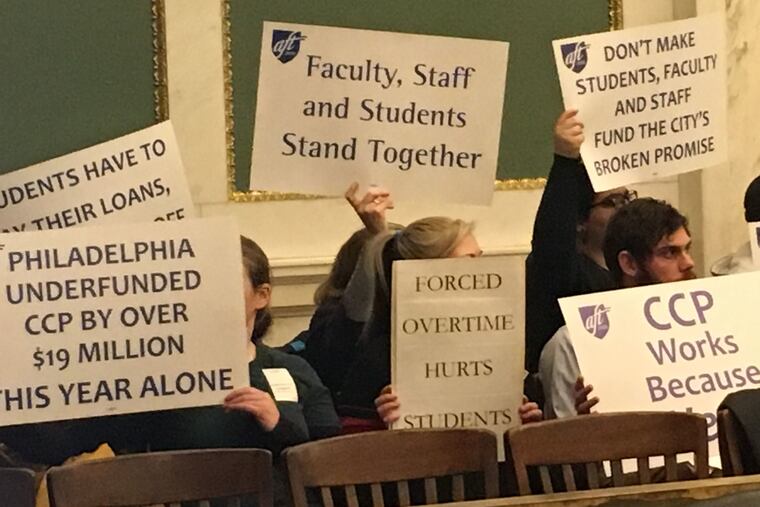CCP faculty overwhelmingly votes to give union leaders right to call a strike; walkout could occur as soon as next week
Faculty and support staff at Community College of Philadelphia voted Wednesday to authorize union leaders to call a strike to resolve negotiations that have dragged on for three years. A walk-out could occur as soon as next week.

Faculty and support staff at Community College of Philadelphia voted overwhelmingly Wednesday to let their leaders call a strike as soon as next week, after negotiations that started three years ago failed to yield a contract.
Union officials said more than 90 percent of the members voting were in favor. The exact count, however, was not available Wednesday night.
A strike could halt classes for the college’s 27,800 students just weeks before the semester’s end.
“If our members vote yes to strike tonight, it will be because they understand the future of the college is at stake,” union co-president Junior Brainard said Wednesday morning before the vote was tallied. “They’re not simply striking for themselves but for Philadelphians to have access to high-quality, affordable higher education in Philadelphia.”
The union on Tuesday made a new “pre-strike offer” to the administration with concessions on some of the thorniest issues dividing the two sides. The administration wants new faculty to teach five courses per semester; they currently teach four. The union proposed that faculty be allowed to opt in to teaching five courses for a three-year period for extra pay, Brainard said.
The college currently allows faculty to opt in each semester, and nearly a third already teach five courses.
The union also has agreed to slightly higher out-of-pocket costs for health insurance, he said. Members continue to seek salary increases, especially for the lowest paid.
“That offer is a way for them to avoid a strike,” he said.
But the administration said in a statement last night that the offer made by the union was too costly and didn’t include some of the changes it felt were necessary. The first five years of the union’s contract proposal would cost $20 million more than the administration’s proposal, the administration said.
“While the college deeply appreciates the work and contributions of its employees, these negotiations will lay a foundation for future student success,” the school said in a statement. “They will affect how much more tuition students will pay, not only in the next academic year but also for years to come.”
The strike-authorization vote was the latest development in negotiations that have stalled, largely over issues of faculty workload, health insurance, and compensation.
School president Donald “Guy” Generals in January said the college was considering imposing a contract on union members, its so-called last best offer, which was released last May. Union members have been operating under the terms of the contract that expired in August 2016.
Generals said last month that if a strike were to occur, the college would try to maintain the class schedule. But if not enough faculty showed up, classes would not be held, he said.
Last month, the union, which represents 1,200 faculty and support staff, voted in favor of holding Wednesday’s strike vote. Ninety-one percent voted for the move.
Meanwhile, City Councilman David Oh earlier this month introduced a bill to increase city funding for the college. The bill would transfer $19.25 million from the city’s general fund to the college, raising the city’s funding level to one-third of CCP’s operating costs. When the state law establishing community colleges passed in 1963, local sponsors were supposed to provide one-third of the funding, with another third coming from the state, and the final third from students.
But that hasn’t happened, and students consistently have shouldered a larger share of the burden.